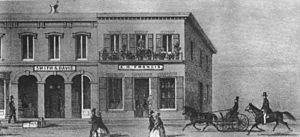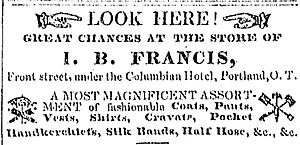Abner Hunt Francis facts for kids
Abner Hunt Francis (born around 1813 – died March 28, 1872) was an important African-American leader. He was an abolitionist, which means he worked to end slavery. He was also a successful businessman. Abner fought for equal rights for Black people in places like New Jersey, Oregon, and British Columbia. He helped start groups that were against slavery. Later, he became the first Black lawmaker in British Columbia.
Contents
Abner's Early Life
Abner Hunt Francis was born on a small farm near Flemington, New Jersey, around 1813. His family's farm did well, which meant Abner could get a good education. After finishing school in New Jersey, he moved to New York. There, he learned more about math and how to keep business records. He also trained to become a tailor.
Fighting for Freedom and Equality
Abner Hunt Francis was a strong leader in the Black community throughout his life.
- In New Jersey, he spoke out against groups that wanted to send Black Americans to Africa.
- He also worked for a famous anti-slavery newspaper called The Liberator.
- He went to big meetings where Black leaders discussed how to gain freedom and rights.
Later, Abner helped start the Anti-Slavery Society in Buffalo. He worked for important changes, like making sure Black and white students could go to school together. He also helped organize a campaign to get Black people the right to vote.
Abner often wrote to Frederick Douglass, another famous abolitionist. They talked about the fight against slavery and the state of the country.
Abner's wife, Sydna Edmonia Robella Dandrich Francis, was also a dedicated activist. She was a key leader in the women's right to vote movement. She also worked hard to end slavery. Sydna was the secretary of the Female Dorcas Society. She was also the president of the Ladies' Literary and Progressive Improvement Society of Buffalo. Her writings were sometimes published in Frederick Douglass's newspaper, The North Star.
Moving West and Continuing the Fight
In 1851, Abner Hunt Francis, his wife, and his brother, I.B. Francis, moved to Portland, Oregon. They were some of the only African-American people living there. Soon after they opened a boarding house, Abner's brother was put in jail. This happened because of a law from 1849 that tried to keep Black people out of the territory.
A judge ordered the family to leave Oregon within four months. However, 225 people in Oregon signed a petition asking for an exception for the Francis family. This led to an attempt to get rid of the unfair law, but it didn't succeed.
Even so, Abner and his family stayed in Oregon for 10 more years. He became very successful in business, earning a lot of money. Eventually, his businesses faced problems, and the family decided to move. In 1865, they left Portland and moved to Victoria, Canada. There, Abner made history by becoming the first Black person elected to the Victoria city council. However, he resigned the very next day. This was because his name was not on an official list from 1863.
Later Life and Passing
Abner Hunt Francis passed away suddenly in 1872. His obituary, a notice about his death, was published on March 28 in the Daily British Colonialist newspaper. He was remembered as a very important member of the Black community. His death was caused by an illness of the bowels.
See Also
 | Precious Adams |
 | Lauren Anderson |
 | Janet Collins |



